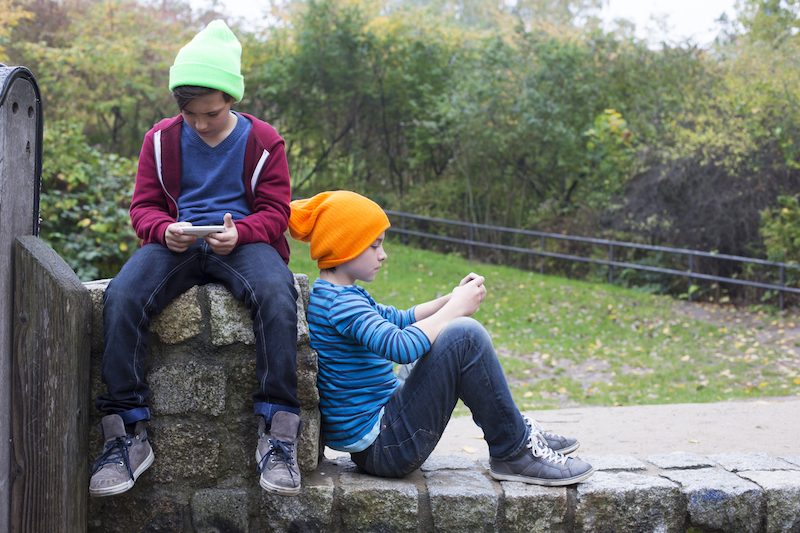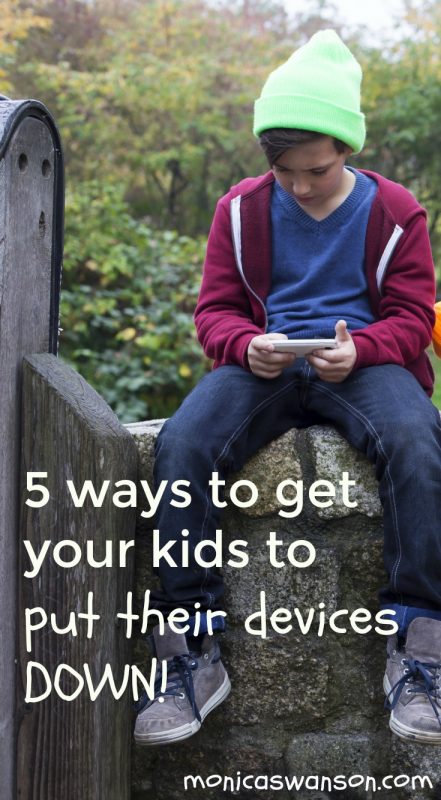5 ways to get your kids to put their devices down.
I’m sure you’ve never said these words before, but if you visit my house…occasionally…sometimes…perhaps you might hear me yell scream gently ask (through gritted teeth): “Would you PLEASE put your phone down?!”
And sometimes…when I have to say that over and over and over…it gets on my nerves.
Like bad.
Of course I know I’m not alone in this–the truth is, I hear this complaint from parents allofthetime.
This generation of kids have become more and more attached…(dare I say addicted) to their devices.
(and so have we, but it’s easier to talk about the kids, right?)
Whether they’re scrolling through instagram, watching YouTube videos, texting friends, or playing anther game (“Mom–I have to water my crops!!” “Wait, I just found another Pokemon!”) It never ends! And we all know that technology has plenty of positive things to offer, but man oh man these devices can be a time-sucker and a huge frustration to families.
Rather than complaining and nagging endlessly, I am trying to find some practical ways to get our kids to put the devices down. Here’s a list of five things we are doing to provide some healthy boundaries for our kids with their phones and devices.
Hope one or two of them help you too.
1. Create a family turn-in location and post the rules. This may be the simplest solution, yet the last thing most parents try. Kids do NOT need a phone next to them while they’re doing homework. Or device at the dinner table. Or in their bedroom. If you’re letting them keep their devices at night, you’re asking for trouble. My suggestion: Simply establish a central place where all devices can be left and charging at designated times. Then determine what your rules are. Yes, you can have different rules for the teenager from the ten-year old. Set the rules and stick with them.
Also: Establish consequences for breaking the rules! If teenagers need to turn phones in at 9:00 PM (which is our family rule) and at 9:30 PM they’re in their room with their phone, then they should lose it for the next day. (or you choose the best consequence.) Be firm and be consistent and I guarantee they’ll learn to follow the rules.
PS Having the central turn-in spot also makes it easy for you to scroll through their recent feed, text messages, etc., which I highly recommend, but something I tend to forget if the phone isn’t in an easy place for me to get to.
2. Offer alternatives. Why not compete with the lure of the device by showing your kids how much fun life can be UN-plugged. Offer some non-electronic options and make family life fun again. Grab a deck of cards, a puzzle, a game, or some art supplies and get the family to do things together. (of course if the weather cooperates I suggest getting outside to play together.) Honestly, when my boys get on a roll with a deck of cards, they totally forget their phones. (just imagine.) But the interesting thing is if we don’t direct them there, they’re naturally drawn back to the habit of their devices every single time.
3. Lead by example…In other words: Put your own phone down! How many times have I snapped, “Put your phone away!” while peering over the top of my own? (ouch, guilty.) We all know the saying: ‘kids will learn more from what we DO than what we SAY’. So let’s all work on being intentional about using our phones and putting them away.
4. Give them more to do. This winter I’ve been reading another one of the Little House in the Big Woods books to Levi, and it’s made me begin to think I might be raising a bunch of wimps! haha. Seriously, back in the prairie days, even the little kids were up in the dark, working in the freezing winters, helping parents…In fact, IF they got to go to school they were lucky! Hard work was a part of life. (Boy have things changed, right?) Of course I’m glad that our kids don’t have to work that hard to survive any more, but perhaps the pendulum has swung too far in the opposite direction. (Do I hear an amen?)
We use a family chore list which definitely helps, but we are working on assigning our boys extra jobs (some paid, some not) when we can. Bottom line: A little hard work will NOT hurt our kids, and if you’re sick of your kids vegging out on their devices all of the time — a little work might be the perfect cure.
5. Challenge and reward: Offer your kids a challenge or incentive for unplugging more and finding positive things to do with their time. You might challenge them to read a certain number of pages or to learn a new song on their instrument, or create something beautiful in the time they would normally be scrolling through instagram or playing a game. Turn it into a family contest or offer a reward for being on their phones an hour less a day for a full week. In the end they might just realize how much more time they have when they re not busy staring at a screen.
There are plenty of creative approaches we might take to regain some balance when it comes to our kids and devices. I’d love to hear any tactics that your family might be using too. So comment and share! ALSO: I’d love to know what part of kids and devices is the most challenging for you: A certain time of day? Gaming? Social media? Let’s chat in comments!
And as always, I’d love for you to share this post using social media buttons below. Mahalo!
Until next time…much Aloha,
Monica




Just had a very disappointing dinner with three of my grandchildren and their parents. Noses in their cell phones and I didn’t think it was my place to suggest something else. In retrospect, I should’ve insisted on a board game (something that we’ve always liked) or a card game. Instead yesterday I just kind of moped and bewailed.
Taking away technology from children is extremely difficult for us as parents. Unless parents are extremely firm, children will simply follow and put their devices down. However, this is not always the case; I agree that acting as a role model for children can encourage them to do so.
Great response. I hate the idea of being the “nagging g-Ma.”
“ Yeah, I’ll put the phone down. I won’t be happy.”
We have a central turn in location and a turn in time. It’s tough to enforce that. It’s like if we (parents) don’t remind them, it doesn’t happen. It’s looking more and more like consequences will have to be implemented.
We still struggle too, Patty. I think it is one of those things that just has to become a habit. (the hard part of parenting! :)) Well done though, you’re on the right track!! aloha and thanks for taking the time to comment.
Hey Monica! Great ideas. Definitely going to try these!
In a post a few years ago, you said you were doing some projects and such in the bedrooms! I’m in the planning stages of remodeling my teens bedroom so some pictures or a post would help! Thanks so much for being an inspiration and bonding our family together.
If I want to capture the attention away from screens- my no fail is to play with my boys. A game, a walk, reading a book aloud, building something… They all work! At least at this point, my guys choose my attention over the screen. However, it is a struggle when I am busy and/or tired. Still working on the having less to do vs. getting more done. Thanks for the great post, I am sure iphones are in the not so distant future for my boys. Nice reminder to start discussing the limits with my husband now.
Love that Shannon! I agree–if we offer our time and attention to our kids (at almost any age!) they’ll take it. Oh that is so hugely important to remember. I’m working on the less to do thing too…maybe forever. 😉
Bless you!
It’s actually very simple. Who is the parent and who is the kid? Who bought it? You give and take it during appropriate times to play and not. You take it at bed time,expecially teens. What do you expect when these devices are given to children to ocupy their time instead of playing and studing. Do you really think that have the mental capacity for desernemt?. They copy what they observe, so what behavior are you the parent displaying? Monkey see Monkey do!
Yes, that is exactly my thoughts and that is why I wrote this–To offer some practical ways parents can apply all of those principles. 😉 Thanks Debbie.
What about keeping the kids safe around inappropriate texting and websites, cyber-bullying, etc..but not invading their privacy at the same time? How can I check my children’s devices to help protect them without making it feel like I just “read their diaries” while they were sleeping? Devices become fairly private belongings for a variety of reasons.
I’d like your thoughts on this for my own children and my step children, as there may have to be a distinction between what’s appropriate for my birth childrens’ device and what’s appropriate for me to do with my step children’s device.
This is a really good question, Shelley. I hope that Monica, or someone else, will take a moment to provide some insight and advice for managing these boundaries. Thanks!
Great question Shelley,
As for our family (at this time anyways–) we believe the benefit of checking kids’ devices outweighs the concerns. When they are young (anytime in their growing up years) I would not recommend kids use their phone or device for anything too private–like a journal would be. It is too easy for things to leak out–accidentally or otherwise. Therefore I tell my kids to use their devices for the purposes we bought them: To communicate mostly, but anything else they do they should know that we can and will be checking. It is accountability for how they communicate with others and social media and etc. If they want a private place to get feelings out then they should keep a separate journal (even a file on a computer can work as a journal if they must type it rather than write old-school-style. :)) I understand kids need privacy but as the parent I believe it is our duty to mentor them through the correct use of things and there is nothing on a phone or device that I should not be able to see. If they are texting or communicating with someone, this keeps them accountable to their conduct. The important thing is that our kids know that all of these things are done in love. To protect them and help them. Devices are not a birthright or something kids should feel entitled to own and keep private. They are a huge gift and responsibility and when they are 18 they will have full rights (and hopefully full financial responsibility) so this is their training grounds. 🙂
As for step-children I am probably not a lot of help…Without knowing the nature of your relationship, it is hard for me to give advice. I would suggest workmen that out with their father and coming up with a plan that is fair and as consistent with your own kids as possible. All the best to you!!
You explained it so well here, Monica. I completely agree.
oh thank you!! Appreciate the comment! With Aloha–
I am so happy to see you tackle this issue. Much like we put a Disney movie in for our toddlers to watch so we could cook dinner, I use the phone. My ten year old loves his iPhone but it comes with strings attached. Good grades, assignments completed, fully dressed with teeth and hair brushed, and a spoken agreement that he will put it down the very minute I ask, are some of the stipulations. It usually works but if not, he takes a week brake from it.
I love this post, Monica. And here’s an Amen! We don’t allow any devices when we go out to dinner. It pains me to see families giving in to their semi restless children and putting a phone or tablet in front them while out for a nice meal. My children are now 11 and 8, and they have never been allowed to play on a device during meals just to keep them quiet and guess what? They have beautiful restaurant manners and are a delight to talk to and eat with. I think parents take that tempting easy way out when the kids are little, but I can say from experience it’s so worth the “work” to leave those devices at home. I told my young kids that going out to dinner is special; if we want to stare at a screen or play a game, we can stay home and eat there. It’s now so ingrained in my kids that when well-meaning servers offer my kids restaurant tablets to play on, they politely decline and give me a knowing look that going out to dinner is a special family time meant for talking and interacting! Thanks for these great suggestions Monica. I love the device drop area the most!
Hi Monica. Thanks for this post. Just good timing too, as this has been on my mind regarding my oldest child (18). She received an iphone for her birthday at the age of 14. Little did I know the difference in her life (and time) that it would make (and take). I would love to ‘replay’ that time and begin again differtenly. Anyway, yes, she had had it for 4 years now. You mentioned about ‘monitoring’ the content of one’s child’s phone. My daughter is very private and I have never done this. Personally I do not feel comfortable bringing this ‘rule’ in now, especially that she is 18. My two other children (11 and 15) do not even want an iphone because of the time consumption on this device that they have identified with their big sister.
Good tips and tricks. The turn in time may work for us. The others are a challenge. This is hard to do for all of us in our family. Both my husband and I are engineers and spend tons of time online, even when we are home. My oldest is a gamer and my youngest daughter wants to be a game developer and spins time watching gameplay as ‘research’. Since they do their curriculum online, I do lock up the extra devices until they are finished and I make them get out of the house everyday.